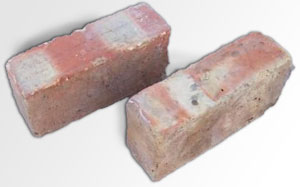This morning I was reading through a 365-day Bible reading plan and I’m traversing through Leviticus — lots of fun! (not really) Luckily, it’s coupled with the New Testament so I don’t give up while going through all the laws and regulations of the old covenant.
 Leviticus 13 is a chapter that would only interest a medical student. It describes the laborious process of determining if someone is clean or unclean from skin diseases as well as how to handle them if they are indeed unclean. Some may have heard this before, but those with leprosy in that time were declared ceremonially unclean, which meant they couldn’t be touched, were instructed not to brush their hair, forced to live outside the city and required to cover their mouths and yell “unclean! unclean!” when they came in town. Some historians teach that the lepers were required to bang bricks together while they yelled so that everyone heard them and could stand clear.
Leviticus 13 is a chapter that would only interest a medical student. It describes the laborious process of determining if someone is clean or unclean from skin diseases as well as how to handle them if they are indeed unclean. Some may have heard this before, but those with leprosy in that time were declared ceremonially unclean, which meant they couldn’t be touched, were instructed not to brush their hair, forced to live outside the city and required to cover their mouths and yell “unclean! unclean!” when they came in town. Some historians teach that the lepers were required to bang bricks together while they yelled so that everyone heard them and could stand clear.
However, if the open sores heal and turn white like the rest of the skin, the person must return to the priest 17 for another examination. If the affected areas have indeed turned white, the priest will then pronounce the person ceremonially clean by declaring, ‘You are clean!’Leviticus 13:16-17
How sweet would it have been to be declared “clean” after months or years of separation from society? from the affection of human touch? from self-dignity and honor?
Many of us feel as if we are ceremonially unclean. We feel that something deep within us is dirty and unloveable. There is a lie deep within that says “I don’t have what it takes” or, especially for women, “I’m damaged and not captivating”. Maybe it’s our past sin or something that marked us when we were young, but I guarantee that the parts that you despise about others, the parts that disgust you most, are the same parts that you despise about yourself the most.
Our inability to love others well is not the disease but the symptom of our own self contempt.
Thankfully, about the time that boredom had taken over, the chapter ended and I read the coinciding New Testament chapter. John 13 describes the last supper with Christ, in which he demonstrates love and humility by washing his own student’s feet. It is evident in the story that Christ knew who would betray him; all the disciples would eventually flee, Peter would deny Christ three times and Judas Iscariot would sell Jesus over to the high priest for 30 silver coins.
Let me take a brief moment and marvel at this, because I’m just realizing it. It’s so interesting to me that the disciples choices were to run, lie or get greedy. Aren’t those our natural tendencies when things get hard?
Jesus says something here that left me reeling for a few minutes as to what He meant. John 13:8 reads: “‘No,’ Peter protested, ‘you will never ever wash my feet!’ Jesus replied, ‘Unless I wash you, you won’t belong to me.‘”
How often are we confronted with the reality of our inadequacy and our response is, “Nah, I’ll fix it”? There is something about this verse that just left me hanging. Especially after reading Leviticus and seeing to what length someone must go in order to be ceremonially clean — “Unless I wash you, you won’t belong to me.” I didn’t quite understand. Was this a ceremonial thing? Was this about baptism? Some versions hinted at it being about the disciples suffering along with Jesus. But none seemed to settle the issue for me.
Then it hit me. Within hours of Jesus telling them this, they would each go about betraying him and would be marked with such grief and guilt that one of them would end up hanging himself. They would be deemed ceremonially unclean in their hearts and minds for knowing they they ran, lied and betrayed the one who they professed to love. They were about to commit the biggest sin of their lives and Jesus was saying, “I already know, and I claim you as my own.”
Are you willing to be washed by Christ? He sees your sin and knows the areas of yourself that even you can’t forgive. Those areas that disgust you when you see them in others. God came for those. Christ died for those.
This goes for believers and skeptics: Stop trying to resist the cleansing forgiveness being offered to you. You can take off the lepers clothes and drop the bricks. Jesus calls you “Clean! Clean!”
So what’s holding you back? What is it that you are self-righteous enough to declare unforgivable when Christ has already forgiven you?

